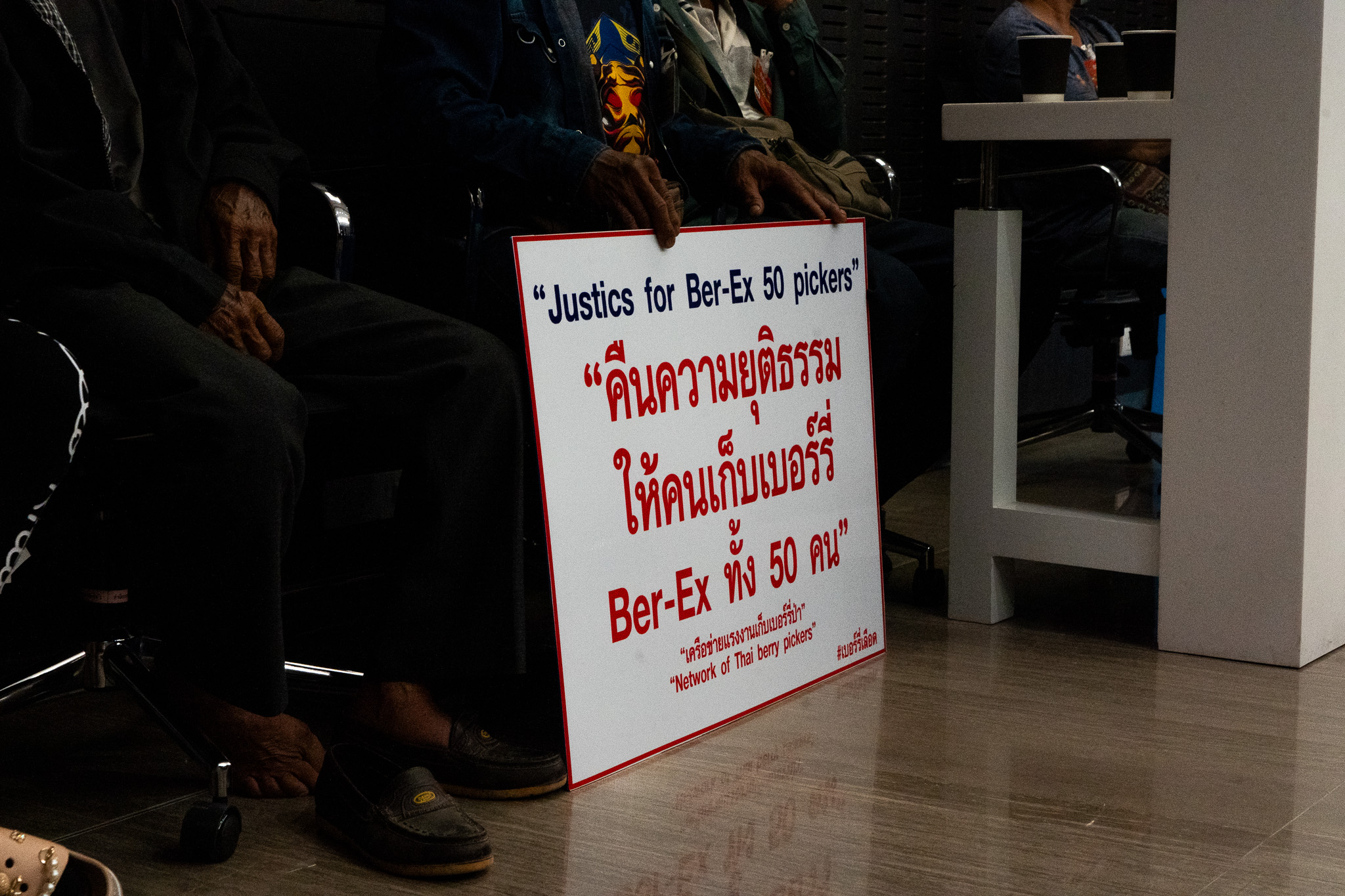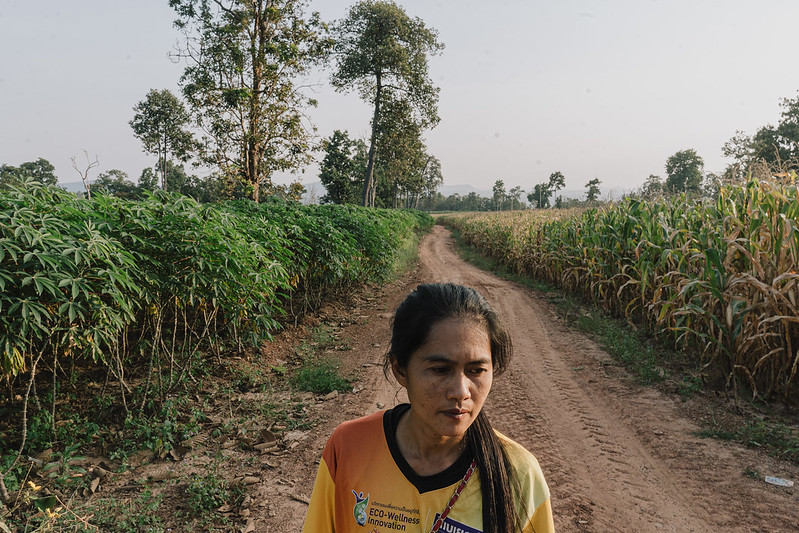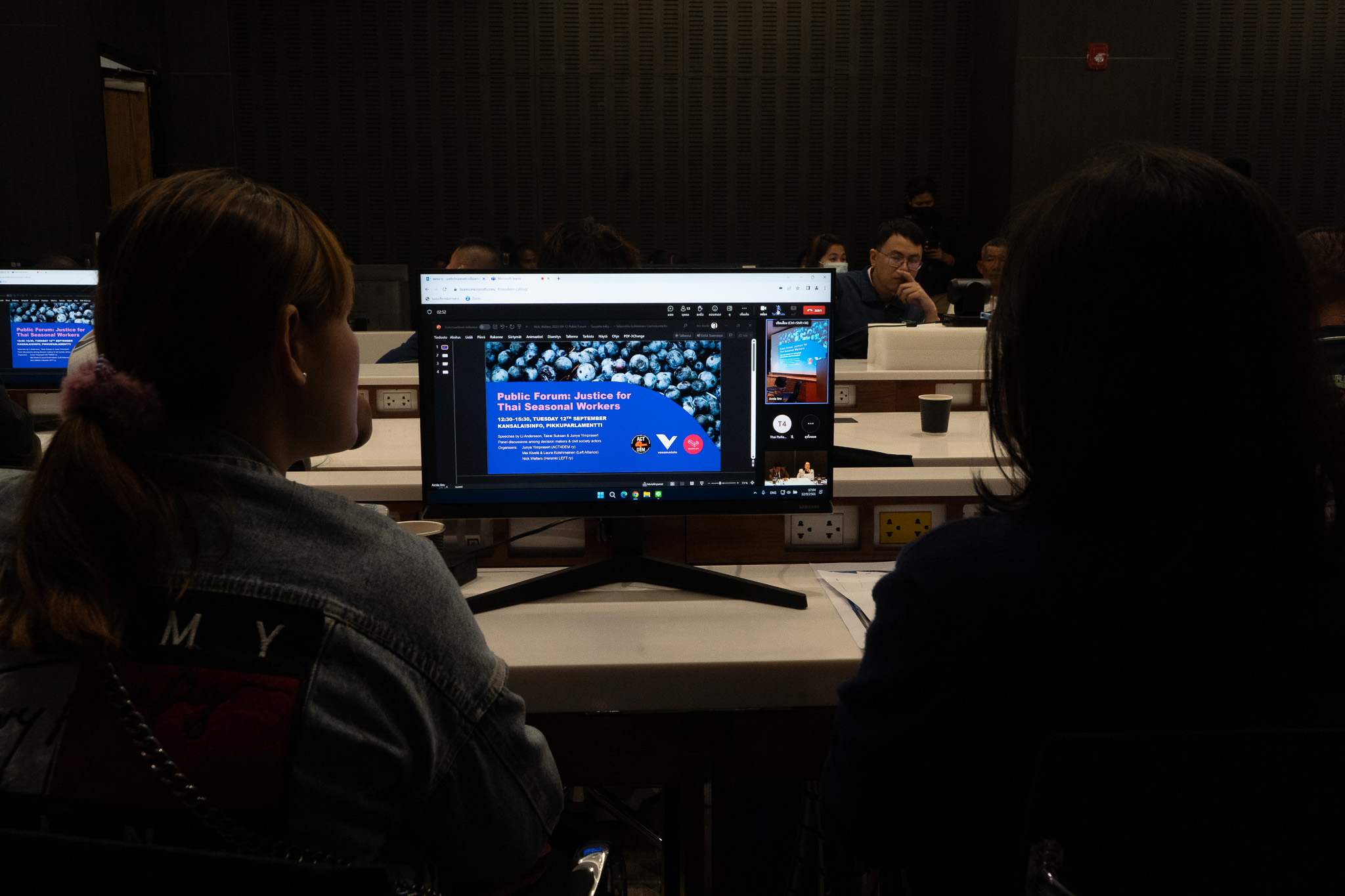In this final part of our four-part story on berry pickers in Finland, the Thai and Finnish governments try to find a way to ensure guarantees for Thai berry pickers. There is, in fact, a decade of issues that have not been adequately addressed. Finnish courts have provided some relief. The Thai police are bringing wrong-doers to account in Thailand. Jenpreeya and her husband have received some justice–just enough for Jenpreeya to open a massage shop in Nong Bua Lamphu. Yet the memory of her time in Finland still brings a bitter taste to her mouth.
At the beginning of the COVID-19 pandemic in 2020, Labor Minister Suchat Chomklin announced that Thai workers had as a whole generated an income of nearly 800 million baht from picking berries in Finland.
In September last year, Suchat met with Tuula Haatainen, the Finnish Minister of Employment, with the goal of raising the standards for Thai workers traveling to Finland to pick wild fruits. Thai workers needed to receive legal protection in both countries, and employers, both in Thailand and Finland, needed to provide proper and equal employment benefits for workers.
Ratthathammanun Meerahannok, CEO of Friend Berry Sweden which employs 1,800 workers, said during the visit by the Labor Minister that Thai workers could earn 100,000 baht or more by picking berries, depending on how hard they worked. He said the company covers their expenses–travel, accommodation, food–and also provides health insurance. Although some seasons see the price of berries drop, he said it wouldn’t affect pickers’ income because the company guarantees a minimum wage for all workers.
It’s true that many say picking berries provides a lifeline. But several others say it’s a painful and difficult experience.
A seeming history of exploiting foreign workers
In September 2013, there had been an incident at the Ber-Ex Oy company’s Saarijarvi camp in Finland. The company had told the Thai workers there that they had failed to reach harvest targets and threatened to deport them. The workers, who had taken out massive loans to come to Finland and were exposed to 13 to 15-hour workdays, vigorously protested against the company’s announcement. The company called in to evict the workers from the camp. The police found the workers starving and working under horrendous conditions.
The police at the scene said they could not evict the workers, explaining that by law the company cannot force workers to work involuntarily.
The altercations grew worse after the company moved the workers from Saarijarvi to another site in Juva. The company tried to ramp up the pressure by breaking the workers into three groups and sending them to different towns. Two of the worker leaders and eight members in their close circle were moved to Leiksa, just 30 kilometers away from the border to Russia.
Further negotiations and discussions with the company proved fruitless. The workers were told that if they refused to pick berries, they would be sent home. The 50 workers sought legal counsel, and decided to sue the company for human trafficking.
In another case, Thai workers brought a suit against a berry company. In January 2018, Finland’s supreme court convicted and sentenced the owner of the company to jail for a year and 10 months for human trafficking. It also ordered the company to compensate 26 workers who had been there in 2016 for 200,000 euro (7,400,000 baht), an average of 284,615 baht ($7,970).
The ruling said the workers who filed the suit had been exploited as the company put workers into debt by charging them, even before they started any work, for all kinds of expenses–from travel, food, accommodations, car rental, gas, phones, to tool rental and to bed sheets. It also confiscated the worker passports and their return flight tickets. It created an unsafe environment and caused workers to become dependent on their employers. The company fixed its own prices for berries. It provided accommodations that were overcrowded and unhygienic, and forced workers to work 12-15 hours a day with no days off.
In October 2022, the National Bureau of Investigation, the Finnish Border Guard, and the Helsinki Police Department arrested two people for human trafficking. One of them was Jukka Kristo, CEO of Polalica Oy, who denied all charges. The other was Kallayakorn Pongpit, a Thai national who worked with an agency that contracted Thai workers to pick berries in Finland.
The case was triggered after ten Thai workers made a complaint that they had not been paid for the berries they had picked and that they were forced to live and work under onerous conditions. The Finnish police rescued 46 other Thai workers during their investigation.
After the arrests, the Thai Department of Special Investigations raided the involved recruitment agency in Bangkok. It accused the company of collecting 50,000 baht ($1,399) from workers wanting to travel to Finland. Once arriving, the company confiscated their passports and forced them to pay back debts that were allegedly more than what they had actually paid.
Jenpreeya starts over, again
In October this year, Jenpreeya says, the Thai Labor Ministry refused to give her any compensation on the grounds that Jenpreeya had broken the contract which stipulated she was to work on a strawberry farm. Instead, the ministry said, she had gone off to pick wild berries on her own.
She said the company gave her and her husband 40,000 baht each for compensation. Her complaint with the Finnish embassy for human rights violations and human trafficking remains under investigation.
After returning from Finland, many of her fellow workers met a similar fate. Some are drowning in debt. Some became seriously ill. Some are at risk of losing their homes and their lands.
Now 36, Jenpreeya has used her meager compensation to open another massage shop, not far from her old shop. She says she’s been able to earn a decent income in the past two months.
There’s no question about her giving berry picking another try. Even the thought of berries causes her some tension. She says, “I can still remember their sweet and sour taste.”
She hesitates a moment and says with some bitterness, “But now I don’t even want to look at them. I don’t even want to hear their name.”
Note: This work is supported by the AspirE project of the European Union (EU)





